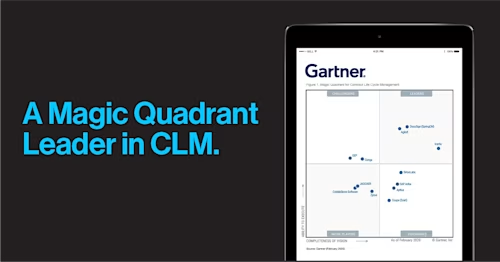
Docusign CLM nombrado líder en el Cuadrante Mágico 2020 de Gartner para la gestión del ciclo de vida de contratos
Docusign CLM fue nombrado líder del Cuadrante Mágico 2020 Gartner para los productos de Gestión del Ciclo de Vida de Contratos.


Nos complace anunciar que Docusign CLM (anteriormente Spring CM) ha sido nombrado Líder en el Cuadrante Mágico de Gartner para la Gestión del Ciclo de Vida de Contratos, en febrero de 2020.
Han pasado 18 meses desde que Docusign adquirió SpringCM, y sólo unos pocos meses desde el lanzamiento oficial de la solución renombrada que surgió de esa adquisición: Docusign CLM. Con esta posición de Líder en el informe inaugural del Cuadrante Mágico de Gartner para CLM, nos complace tener nuestra visión y ejecución validadas.
En su evaluación, Gartner evaluó a los proveedores de CLM en base a 15 criterios que incluyen Producto/Servicio, Viabilidad general, Capacidad de respuesta del mercado y Experiencia del cliente. De los 12 productos evaluados, Docusign CLM fue nombrado uno de los tres líderes. Al explicar lo que impulsó a Docusign a la categoría Líder, Gartner citó excelentes puntajes de experiencia del cliente y capacidades generales del producto, así como altos puntajes en visión completa y capacidad para comprender las necesidades del cliente.
Basado en entrevistas con clientes, Gartner le dio a Docusign altas calificaciones por su servicio y soporte en general. Además, recibimos el puntaje más alto de cualquier proveedor en este Cuadrante Mágico por nuestra capacidad de comprender las necesidades de los clientes, así como la puntualidad y la exhaustividad de las respuestas a las preguntas sobre productos y servicios.
Estamos felices de ver nuestro enfoque en el éxito del cliente reflejado en las referencias de los clientes y en todo el informe. Para aquellos clientes que hablaron con Gartner, gracias por participar. A los ojos de los analistas, sus palabras hablan más que cualquier cosa que podamos decir.
Para leer más sobre la evaluación de Gartner de las fortalezas de Docusign CLM en la experiencia del cliente, la capacidad del producto central y la integración con los sistemas CRM, y para obtener más información sobre la categoría CLM en su conjunto, una copia complementaria de Gartner, Inc. 2020 "Magic Quadrant for CLM" está disponible para descargar aquí.
Por Steve Krause, vicepresidente sénior de Strategy and Product Marketing, Docusign
Publicaciones relacionadas
Docusign IAM: la plataforma de acuerdos que tu negocio necesita




